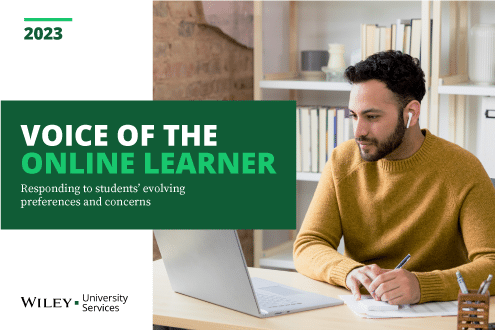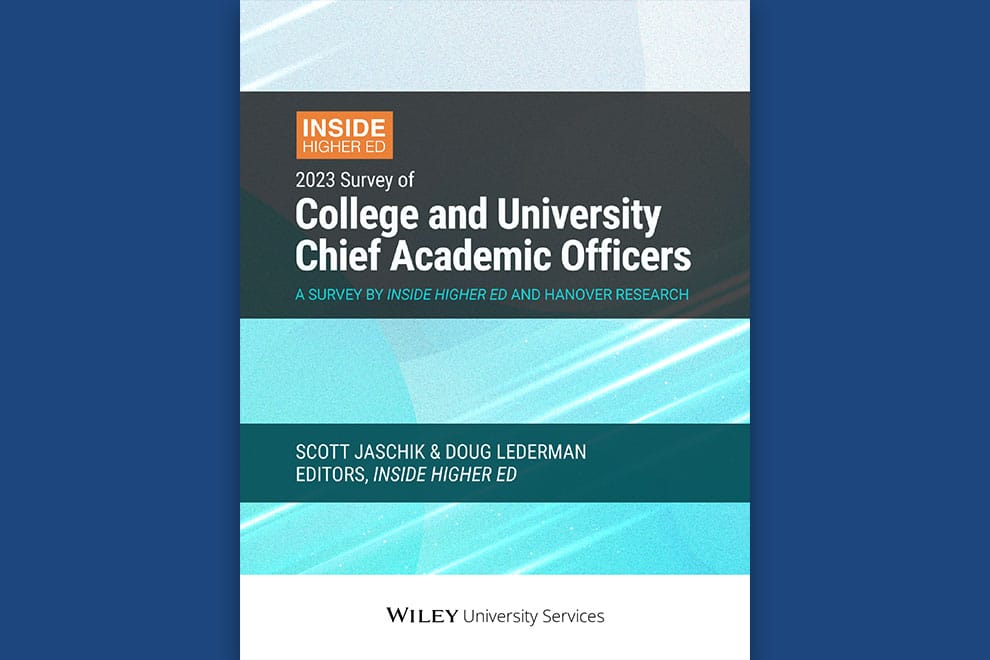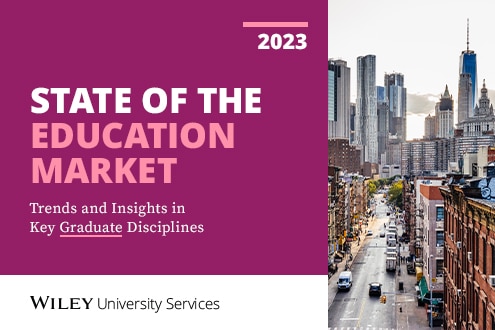Announcer:
You’re listening to An Educated Guest. A podcast that brings together great minds in Higher Ed, to delve deeper into the innovations and trends, guiding the future of education and careers. Hosted by the Executive Vice President and GM of Wiley University Services and Talent Development, Todd Zipper.
Todd Zipper:
Hello, I am Todd Zipper, host of An Educated Guest. On today’s show, I speak with Pierre Dubuc, co-founder and CEO of OpenClassrooms. Pierre is the definition of an innovator. He started working on an idea which eventually became OpenClassrooms, when he was 11 years old. Today, OpenClassrooms offers top-quality, education-to-employment programs and career coaching services for students worldwide. Key takeaways from our discussion today: first, how OpenClassroom hopes to lower the gap between higher education and career by offering a skills-based and practical curriculum. Second, the invaluable experience learners receive by connecting with mentors and career coaches. Third, the opportunity and value of digital apprenticeships to solve the growing skills gap, especially in technology careers. And fourth, the difference between up-skilling and re-skilling and how these relate to workforce development and the future of work. Hello, Pierre, and thank you for being here today on An Educated Guest.
Pierre Dubuc:
Hi, Todd. Thank you for having me.
Todd Zipper:
All right. I’d like to dive right in and learn a little bit more about your backstory. I know you were an entrepreneur and started noodling on this idea for OpenClassrooms when you were 11 years old, from what I understand. I also understand that most French-speaking people who have learned to code outside of traditional education have learned through OpenClassrooms over the last decade. How did this all come about?
Pierre Dubuc:
Well, it’s a long story because we started, my co-founder Mathieu and I, when we were really young in middle school at the age of 11 and 13. I was 11, mathieu was 13, and we started in middle school to create online courses the way we wanted them. So, Mathieu created loads of courses, I built the platform, we published it online. It was really courses to help some friends learn web development, so it was like HTML, creating websites. We built this online learning community at first just as a hobby, frankly. And then we did so parallel to studies in middle school, high school, college, it became the reference platform to learn coding in French, and then from there we switched at the end of those studies to a more fast growing entrepreneurial journey.
Pierre Dubuc:
We made it a full-time job, we started to raise venture capital and then from there to start OpenClassrooms as you know it today. That was in 2013, so after more than a decade doing it as a hobby and we build OpenClassrooms as a mission driven company because of the DNA, because of the history of the projects. So we built it as a mission driven company and the mission of OpenClassrooms is to make education accessible.
Todd Zipper:
Yeah, that’s awesome and I know you talk about something that’s near dear to our heart at Wiley, which is career-connected education. Education that leads to a meaningful job and livable wages and that’s what you’ve been up to for a long time here. I really want to get under the hood of what OpenClassrooms is, but I think it’s worth noting that confidence in higher education continues to fall and based on a survey by the Association of American College Universities, only 60% of employer respondents said they believe that college graduate possess the knowledge and skills to succeed in entry level positions. Are you surprised by that number and how skewed it is?
Pierre Dubuc:
They’re definitely scary, aren’t they? I’m not surprised, obviously, because I talk to employers all day long. OpenClassrooms work with 2000 employers to try and up-skill and re-skill their employees and work with them on their apprenticeship. So, it’s nothing new to me, but it’s definitely very concerning and it’s getting worse. Year after year you’re going to see increasing numbers of employers thinking that college graduates are not ready for the skills and the jobs they require. It is definitely a major issue as colleges, universities, and generally speaking, higher education and vocational training markets don’t seem really to align to employer’s needs. So, we definitely need to cross correct this a bit and this is what we’re trying to do with OpenClassrooms.
Todd Zipper:
Pierre, I know that you’re in the US now, but obviously started this business in France and have a big following in Europe. Do you see similar trends in both Europe, let’s say, and the US and obviously the rest of the world as well when we talk about these unprepared folks graduating from college traditionally?
Pierre Dubuc:
The misalignment between what you learn in college and what employers would like you to learn and to have as skills for their own jobs and roles, that’s the same problem pretty much anywhere in the world. What is more concerning in the States, I would say converted to Europe, is obviously the financial return over a college degree, because higher education is typically, on average, more expensive in the States; we’re talking about tens of thousands of dollars, whereas in Europe typically it would be lower. It might be publicly funded as well, so the ROI tends to be not that great because it’s still on the line, but I would say less disastrous. So, I’d say the gap is definitely more of a problem in the States, the root cause is the same in Europe or in the States. The misalignment between the curriculum offered to college students and the employer’s requirements.
Todd Zipper:
Great. Well, we’re going to get into all that, but first I want you to lay out for the audience, what OpenClassrooms is. I came about this company sort of grouping it in this sort of MOOC like, direct to learner big platforms like Udacity, Coursera, edX, MasterClass et cetera. But as I learned more, there’s something frankly, more multidimensional about OpenClassrooms and what it is doing despite reaching hundreds of thousands, if not millions of people. So, I would love for you to kind of start from the top and tell us what OpenClassrooms is.
Pierre Dubuc:
So OpenClassrooms is as mentioned, it’s a platform, it’s a mission driven company. The mission of OpenClassrooms is to make education accessible and especially our education leading to jobs. So the end game for the north-star of OpenClassrooms is all social impact. We track it in the form of the number of career outcomes. Basically the number of students we place in the workforce. Young people for the first job, working adults for promotions, salary increase, switching careers, creating their own job. When we started 10 years ago, we became the very first fully online college in France. It’s quite differentiating, quite unique, because we’re an online education platform, but we’re also a college. So we have own degree award powers, that means that we operate on associate bachelors and master degrees leading to tomorrow’s jobs, tomorrow skills. So, it’s very much career oriented, skill based. I.
Pierre Dubuc:
So it’s based on skills, you have to demonstrate your skills through projects. You have courses to acquire competencies you need to be successful and then you’re mentored. You have one-on-one mentorship sessions with an industry practitioner. So every week you’re going to spend roughly half an hour to an hour with your mentor over the course of say 12 months. So, you’re going to meet your mentor like 50 times. So it’s a very high touch human based pedagogy and then the model of OpenClassrooms is obviously oriented toward employers. So the outcome, again, we’re talking about jobs and career outcomes. To get jobs, you need employers. So we work closely with employers, it’s a B2B mobile. We work with employers from Amazon, PWC, McDonalds and Target. So we do up-skilling, re-skilling and apprenticeship programs for them. So, we train more than 300,000 students a month now.
Todd Zipper:
That’s incredible, because when you think about the largest online universities, at least in this country, that would be the number one, right? Whether it’s Southern New Hampshire or Western Governors, they’re just over 100,000. Let’s unpack this a little bit more, you referenced a few of these things. First off it sounds like you’re not rejecting the degree per se, right? So, when we think about a lot of these alternative certification or credential providers, whether it’s boot camps or even short course providers, they’re typically not providing any kind of degree. It sounds like you have embraced at some level the degree, so it’s a little bit of a dichotomy. Maybe you can talk about how that fits in with the model, both doing kind of short courses and shorter durations. Obviously, we’re not talking about three and four years. We’re talking about maybe one year, slightly less. How does that all work for you? And maybe you can also touch on your belief in a student getting a bachelor’s degree or master’s degree and why that’s still important in the market.
Pierre Dubuc:
It’s a really good question. All belief is really on skills and competencies. So we’re not there to make millions of students graduate with a college degree, I mean, great if we can do that, but that’s really not the end game. The end game is the number of career outcomes, job placements and jobs and skills, basically. But, the market still requires largely degrees. So even in the States, right now, there is a huge t shortage in tech and digital skills. You’d be amazed to know that 60% of job postings on software engineering in the States require a college degree. So employers are changing the hiring policies and practices to go from the degree requirements to skills, but it’s an ongoing process. And we’re far from completely there. So degrees are still a proxy for quality and for competencies. Sometimes it’s an unfortunate proxy, probably not the most efficient proxy, but it is still the case.
Pierre Dubuc:
So we wanted to create a very high quality education at , competency based education, to make sure that we provide the right skills for the right jobs in high demand. We can connect students and graduates to employers, and yet at the same time align this system to more of the traditional academic system and grant degrees. So there is no question around whether this graduate or this student is wealth, the investment for an employer. So this is what we did. We got full degree awarding powers in Europe, and we are building the same again in the States with US degree accreditation as well.
Todd Zipper:
It’s fantastic. So I want to jump into some of the elements of the program that really stand out for me. You mentioned mentor. I also believe there’s a career coach. Can you kind of paint a picture of what this looks like for the learner? I think I read somewhere that it’s about 20% theory, 80% practice. How many hours per week, is it per student, let’s say to go through this as a part-time full-time and maybe if you can round it all up, of course, talking about cost, which is always on everyone’s mind when we think about a college degree.
Pierre Dubuc:
We have kind of a very like flexible approach because we can go from a fully flat college degree down to just the course of 5, 10, 20 hours. It’s a very module, very gradual system, but let’s take a typical like associate degree that could be 12 months long, full time. Obviously can do it. Part-time as well would take long, longer. You can take a break, come back, you can accelerate your learning. You’re going to go at your own pace. So if you want to go faster, you can go faster. If you need more time and do it part time, then you can go also slower. You can stop and then roll at any time of the year. So it’s not just a term starting on a given and months. You can start tomorrow or in three weeks, if you like. And then we design and we operate the full experience from orientation admissions.
Pierre Dubuc:
We provide career counseling as well. Then enrollment, we’re going to teach you through online courses. So courses are like MOOCs, Massive Open Online Courses. So you have videos, take sometime exercises, activities, and so on directly on the platform, then you have to complete projects. So a dozen project for 12 months, long program, typically projects are case studies. There are like the real world stuff. So it’s a learning by doing a project. As you mentioned, 20% theory, 80% practice, you’re going to jump right in projects. And then to complete your projects, you need to understand the theory so you can leverage courses to do so. And then you have access obviously to model like social network with all the students and mentors and teachers. You can collaborate, you can work to get other, you can ask questions and so on, but the cornerstone of is what we call mentorship.
Pierre Dubuc:
So you’re going to have a weekly mentorship session with an industry practitioner, an expert in the field. So if you study, let’s say AI or data science you’re going to have in front of you, maybe a data scientist from say Google or tech company. And this person will coach you with tutorial every week on a one-on-one basis via video conference, same mentor every week, it’s mandatory. So that means you’re going to really see your mentors 50 times in a 12 months long program. So you build a really strong relationship at the end of every project you’re going to have to defend your projects in front of an assessor, validator. So that’s a defense session. It’s also via video conference in front of another person, it’s not your mentor. And this defense session will be recorded in video as a proof of your skills. So this is when we assess your skills, but it’s also way to build a portfolio for your future employers. To demonstrate what you build and how you thought about it and so on.
Pierre Dubuc:
So you have a dozen project to complete. Every project will make you validate skills in a set of skills, align to a job. Because the way we build programs is to that we start from employers needs, which jobs are in high demand, which skills behind those jobs. And then we build the skill set and we build a curriculum from there. And then end of curriculum, you completed your projects. You’re going to go through a jury. You’re going to be awarded with your degree your credential will offer you as well. One-on-one career coaching, same principal. You have a career coach by a video conference every week, one-on-one basis, they’re going to review your CV, your cover letter help you out, reaching out to employers, maybe like trying and working on your interviews, technical interviews as well. We have a network of thousands of employers we’re going to connect you to. And we are there to help you until the very last mile, meaning until you find a job.
Todd Zipper:
Well, Pierre, that’s pretty amazing. And the thing that strikes me is the in person experience that everybody sort of yearns for at some level is the intimacy they have with the instructor, the faculty member. And yet all of us can reflect on our experiences when we had that. And often it was a big classroom, sometimes a huge lecture hall. And wasn’t anything like getting one hour of mentoring for an expert in that particular subject area. So I commend you for that, because it’s interesting. You’re bringing sort of this, the best of both worlds, this the MOOC like platform, the Open Massive platform that can leverage the best content, skills, videos, et cetera, but also the one-on-one coaching that people really can’t advance that out. Well, unless they’re getting that individual feedback. So that really is a pretty powerful model. Can you touch on the cost? Because one of the things that I’ve read and discovered is this idea of a job guarantee, which honestly is probably the single most attractive thing that I have towards your model. And so I’d love to you to unpack that for us.
Pierre Dubuc:
Yeah. Your answer to that question, price point would be typically between fall to $10,000 for a full college degree. It’s interesting to add to that 85% of our students don’t pay anything and we are never pay anything. So it’s that free. Why? So? Because they’re financed by employers and governments, so they don’t have to pay for any tuition fee zero. So the way we do that is by connecting employers to talent and notably through apprenticeship. If employers are willing to hire new talent and build talent pipelines, then they can invest in such talent pipelines by offering a partnership program. So it’s a learn and earn program in which you would work for four days a week and be trained for one day a week on a specific subject for 12 months typically, and you have a job from day one, you have a salary and tuition fees are covered by the employers. So to us, as a mission run company or mission is to make education accessible. It means also to make it financially accessible, hence the way we structure our price point. So it’s not crazy expensive, but also the way we leverage other funding mechanisms, financial add to make sure that underserved and underrepresented populations can really have access to high quality education and high quality jobs.
Todd Zipper:
So what your model, it’s interesting, because Wiley, we talk about this model called higher-trained-deploy. We’ve been in it now for a few years where really attracted to me in that was starting with the employer, the job that employer knew they needed to bring somebody in for. And then they work with a third party like Wiley to hire an individual, which is a lot of process finding that person, training that individual typically in the technology realm of subject areas and jobs, and then deploying them. And it seems like this right to left education process. Well, first to me, it eliminates the friction for the learner and the employer is really powerful. It seems like you’re doing a similar model to that. Would you say that’s correct?
Pierre Dubuc:
Yeah, totally. We would call it typically apprenticeship. And the way we do it is by leveraging employers relationships to make sure those partner employers hire apprentices from day one. It’s really amazing, because on apprenticeship you would have typically a completion rate of 80 to 90%, and then a job placement rate at the end into like families sustaining a job of 80% as well. So really high completion rate, especially when you compare it to like your typical higher education program. And especially when you consider also that you have much more diversity through those programs as well, which is an angle that employers have in mind clearly.
Todd Zipper:
Yeah. So maybe we could just double click on apprenticeships. So this is something that you evolve to into, I think, believe in Europe, which obviously apprenticeships have been a big way that those systems operate and work, where in the US, it hasn’t been as big and when it has existed, it typically existed more in the trades, vocational type of areas that are a non-technology related. And yet you’re again, define that model where it seems like the apprenticeships that you’re exploring are more around technology careers. Is that correct?
Pierre Dubuc:
That’s correct. We could call them tech apprenticeship, because we’re talking about not only trade jobs or lower levels of qualification, but you can actually learn a tech job through apprenticeship. So you can become a software engineer. You can become an IT support technician. You can become a digital marketer, data scientist, cyber security expert for apprenticeship. You can even get a college degree for apprenticeship that would be called degree apprenticeship. It’s actually interesting to know that 10, 15 years ago, only in Europe, apprenticeship was understood the same way as you described meaning, lower levels of qualification, trade jobs only you want to become a carpenter, a plumber. And it was frankly less prestigious than a more like formal academic education. But that challenge over time dramatically because of policy challenges, but also because of employers really hiring more and more apprentices.
Pierre Dubuc:
So the number of apprentices in Europe grew significantly Tier One Colleges and Universities started to implement apprenticeship aligned to their degree. So in France, where I come from, you can get an Ivy League type master’s degree through apprenticeship. It’s a thing. So it’s quite amazing when you think about it because it means that it can be as prestigious as your college, your four year bachelor’s degree. So when you think this way, then you shift completely the parroting and you think maybe actually apprenticeship should be like a really large part of an age group, and could become not only 600,000 apprentices in the States right now, but 1 million and maybe 2 million, which is the target that the current administration has set to grow the number of apprentices.
Todd Zipper:
Yeah. So it’s a good point because in the last, I guess now, including Bidens three administrations from Obama, Trump to Biden, they’ve all been very much in favor of apprenticeships. Each of them, and I’ve never seen an issue, that’s gotten more bipartisan support and yet we have not been able to move the needle on this concept. So what do you think needs to change to sort of accelerate? Is it the employer side of the equation to need to step up and offer apprenticeships and are the universities that need to register as apprenticeship providers? How are you thinking about this?
Pierre Dubuc:
The number one issue is the branding issue. As you mentioned, apprenticeship is understood as, trade jobs and lower level of qualification kind of stuff. It is challenging as more and more employers, really big brands like IBM and Amazon and Bosch and many others are pledging to hire 100 of apprentices, 1000 of apprentices to develop more and more partnership programs. So that’s clearly shifting and moving the needle. It’s a branding issue, first of all. So it can be solved by employers, even per pledge to hire more apprentices can be solved also by States and by policy makers to just communicate more on the fact that apprenticeship is not just for construction jobs or for truck drivers. It is also a matter of funding and of bureaucracy, I would say, because right now the system that we have in the States is called Registered Apprenticeship Program. Its national registration within 25 states. Then it’s a state by state approach in 25 other states. So there is a level of complexity that employer don’t really want to deal with right now you have only local providers that don’t really skill the way those larger employer I mentioned would like them to, there is also some room for platforms or providers like us to come and provide apprenticeship programs really at scale and not just for a few thousand apprentices or a hundred advances in the given state.
Todd Zipper:
Thanks for that explanation. So I want to try to define the problem if you will, that you and I have been sort of dancing around, which is really this job skills gap. I think and you could define this better OpenClassrooms as primarily focused on some version of digital skills, whether it’s software development or data science, cybersecurity, automation, you can it for us. And so from my understanding the World Economic Forum stated that by 2025, there may be 85 million jobs being displaced and 97 million new jobs being created. So if you think about that’s a global number, but if you think about the scope of that’s tremendous, right? And then if you look at some of the trends over the last several months in the US, we have tremendous amount of job openings that can’t get filled. We have the great resignation. And so how would you define in your mind sort of the scope of the challenge that we’re facing as a society and how OpenClassrooms is trying to sort of solve it.
Pierre Dubuc:
You see many numbers and research and studies on that. Typically, you would see that we think there’ll be roughly between 30 to 50% of jobs being impacted by technology, meaning the skills behind those jobs will change in the next eight years so by 2030. The lower estimate now is roughly 1 billion jobs, 1 billion people in need to be upskilled and re-skilled. In that huge number, there is a part that just needs upskilling which would be defined as a shorter form of training. And the rest would be, it needs of reskilling, which is much heavier. It would be more 250 hours and more so that could be couple of months, full time up to like a full year, full time. So a hundred million roughly would be typically the number you’d expect for reskilling. So longer programs and 900 million for upskilling. The challenge we are facing is gigantic and there’s no way traditional players, brick and mortar say universities, or even brick and mortar vocational training providers will be able to solve this issue. And by the way, since COVID and the great tragic nation and the talent throughout age and so on, it is growing. We’re not. So the issue is just getting bigger and bigger.
Todd Zipper:
Yeah, I think you just 10Xed. The way I framed the problem which is really daunting and exciting all at the same time. You just mentioned two things, upskilling and reskilling. And I know that as you’ve kind of worked out, going from a more of a direct to consumer company to more of the B2B company, you’ve talked about these five different customer needs thinking from the enterprise perspective of upskilling and reskilling. And I know there’s several others. I’d love for you to just dive a little bit deeper to explain what each of these things are, because frankly, I sometimes confuse upskilling and reskilling and I’m in this industry. So it would be great to kind of frame that a little bit and how you’re tackling the different needs of the enterprise customer here.
Pierre Dubuc:
So enterprise customers typically would have a need for upskilling, a need for reskilling and a need for hiring. That would be the three main buckets and then I can expand and get into the details. Upskilling is short training programs for existing employees. So it typically be 20 hours, 50 hours of training. Imagine your marketing experts, but your skillset has been historically on print marketing. And now you want to learn more about digital marketing and data analytics. You don’t need to go for 12 months on the training program, but you probably need like a full week or two weeks or couple of hours a week for a few weeks of training to learn those new skills. So this is up reskilling, not a lot, lot of time, but a lot of people and reskilling is heavier. Reskilling is to switch careers. So you want to learn a new trade, a new job of new skillset from A to Z.
Pierre Dubuc:
So imagine you are a Worker within a warehouse, you pack orders, you have a job that is paid by the hour, $15 an hour. You want to become a web developer. You want to become an IT technician, you want to become a digital marketing expert. That’s going to take more time typically between six to 12 months. So it’s a longer commitment. Usually the threshold between upskilling and reskilling, we think it’s around 250 hours of training is already like two months full time, right? So it’s already quite chunky. So reskilling is longer. There are obviously less people involved, but still we’re talking, as we mentioned earlier about millions and it’s much heavier, there are two branches of reskilling. One is reskilling within the same organization. So you move from job A to job B within the same organization because your organization might be completely transformed.
Pierre Dubuc:
So think about the banking industry. Maybe you need less bank clerks, but you need more data analysis. So they can switch from being a clerk to analysis job. So that’s internally, and then you have reskilling externally, which can be coin sometimes outs skilling. So it’s reskilling then out placement. So that means you’re going to leave the company and find a job elsewhere. And in this case, we can also help you find a job in another company. Then the last bucket would be apprenticeship. We call that also on ramp, learn and earn, work and study. So there are many different names around that, but basically it’s a pathway to a job. It’s a way for an employer to build a talent pipeline on highly demanded jobs and a more diverse talent pipeline. So, it’s more of a recruitment products to, instead of buying talent, by pushing them all the time, you can build talent. So it’s a buy or build decision that employers have to make when it comes to talent. Now more and more are thinking, maybe it’s actually cheaper to build talent because the talent will be more loyal afterwards than you. You don’t have to just like be over and over and over. And your people are approached by other companies for a higher price.
Todd Zipper:
Pierre. Thank you for that. So I just want also frame the sector a little bit, because you mentioned something about working with governments, and I’ve been reading a lot lately from some of the competition. If you’ve even called that you Udacity, Coursera, they talk about these partnerships with governments. So that’s pretty unique it’s yeah. I mean universities may do things with their local municipalities and governments in some form or fashion, but we’re talking about a level of, and maybe this is really more upskilling type of education. And so one is I’d love to understand a little bit more about how you’re working with governments and what outcomes you’re expecting to see there. And then second, how would you sort of define this industry since we typically have thought about post-secondary education. People have a view of it, of colleges and where they’re located some big brands, some local brands, and that’s about it. You and some of the names I mentioned are kind of changing the game here.
Pierre Dubuc:
Yeah. So we do work with governments on apprenticeship and reskilling. So we’d be mostly workforce development programs. The principal is basically to reskill job seekers and school dropouts and other underserved populations, such as individuals with disabilities, refugees, also folks living in under privileged areas. So we train them on a new job. It starts with coaching, orientation, career counseling, and then all the way I described earlier, then we place them in the workforce typically through apprenticeship whenever possible. This is financed by social programs. So it could be Workforce Development Bots, it could be State Agencies, it could be Public Employment Agencies and Job Centers, sometimes foundation as well could be privately funded. So we call that social programs is really around serving the underserved basically, and bringing high quality education to those of us needed the most. So this is the work we do with governments.
Todd Zipper:
Thanks. So I know that you’ve talked about this BHAG the big hairy audacious goal of 1 million students placed by 2025. And what stood out for me was placed, right? There are platforms out there that talk about serving millions of students, but what their job outcomes are questionable. And we all know about the MOOC, even graduation rates or not even graduation rates course completion rates are in the single digits. And so that’s a huge number, right? 1 million students placed a year. I don’t know if it’s about year or how you’re thinking about that is massive s that makes a huge dent billion person problem. If you will, can you kind of unpack that for us and make it believable? What would have to happen? What are the God believes to make that come true?
Pierre Dubuc:
It’s a big down, but on the other hand, it’s only 0.1% of the total challenge. When you think about it, like 1 billion people to be re-skilled and upskilled in the next eight years. So if we place 1 million a year, whereas talking about like less than a person. So it is very issues yet at the same time, we need many more initiatives like OpenClassrooms to be successful and face this challenge collectively. So what do we need to do? We need obviously to grow all number of students enrolled this year when placed 3000 students in the workforce last year, we placed 15 the year before 4,000. So it’s growing the number of students is more or less between 50% to 100% year over year. Just we’ve been doubling year over year. The one big challenge we are facing is actually not necessarily drawing the number of students, but actually having access, knowing what happens, knowing what the career outcomes, where for, for students. The one way, colleges and universities do that typically is through a survey.
Pierre Dubuc:
So they send survey to their graduates and they ask them, do you have a job? What is your job title? Which employer, what is your salary? And so on. It’s typically used in accreditation processes as well, but the response rate is pretty low. Let’s say the reliability of the data that you collect is so-so. And it depends on the countries and on different cultures as well. Because some folks can be also somewhat ashamed if they don’t have a job and lie to those service salaries included obviously. So now what we are trying to build is also partnerships with governments based on wage and tax data. So we can actually track career outcomes on actual data and not on service. So it would be a much more comprehensive and also long term analysis. And we think that right now we don’t capture of the career outcomes that we generate with our students because of this survey, methodology and very low response rate and whatnot. So it’s likely that by solving the data collection issue. We will actually dramatically improve the number of career outcomes or at least the number we can prove, right? And then from there we grow this number by 50% year over a year and until 2025 and you get to 1 million a year.
Todd Zipper:
That’s an issue that you just hit on the collecting of the career outcomes. That is probably the bane of my existence in studying higher education because there isn’t as much of that, right? Colleges, graduate these students, they might talk about their yield of how many students they accept, but they don’t talk about how many people necessarily beyond graduation, what are the true job outcomes and what is the return on investment, right? And that’s the key to the whole thing there. So hopefully maybe you can make progress on this because I think the government has access to tax data, things that at least in the US that maybe can, at least on the degree side. I believe you still have a partnership with Stanford Online Business, or maybe not business school, but their sort of course non-degree course platform. How do you think about partnering with universities? Do you see that’s part of your equation going forward?
Pierre Dubuc:
It is part of our equation, although we’re clearly not, no PM an online program manager for universities. We’re on provider, we’re on college. We don’t need to be the provider or the partner or the academic institutions. However, we think there is value in partnering, obviously with other institutions, both technology vendors, but also academic universities like Stanford vendors, like Microsoft or Salesforce, we build programs in a co-branded manner. So there is value in joint programs and co-branded programs, especially if you get a Stanford certificate or Microsoft certificate. In other circumstances, you get also full degrees from another university, we have developed also transfer, create transfer agreements with universities like UMass. So that means that graduates from OpenClassrooms can get college credits within UMass at the end. So it’s about the recognition basically of those new innovative programs into the academic world, but also, and frankly, even more so into the employers and the workplace. So this is what we are trying to achieve through partnerships. Then in a second, more like mid long term, what we are building and did so actually in Europe is, helping higher education institutions to digitize their programs by providing them with, platform technology content in a way that is already aligned to their academic credit systems, the frameworks, because we are at college. So it’s easy for them to map this and we can basically operate the online component of the programs.
Todd Zipper:
You mentioned technology vendors, and that really struck a nerve because there’s been an increasing drum beat around big technology companies, whether it’s IBM, whether it’s Microsoft, whether it’s Google, Amazon that have investing heavily in not just the education, their employees, that’s one issue, but the delivering free education around certifications for project management or various other techlogy careers. And I think people will just dedicate it a hundred million dollars in scholarship, which seems like it’s the idea is come get this program. It’s very cheap. It’s through Coursera, I think a couple of them. And then in theory, we have these hiring partners, I’m still trying to unpack it all, but how do you see that? Do you see it as augmentation? Do you see it as competition? Because obviously they’re trying to educate more people to use their technologies at some level. What are your thoughts on this?
Pierre Dubuc:
It’s a movement. It’s a movement towards scale based education and training. It’s a movement moving away from degree requirements for jobs to skills again. So I think it’s great. I don’t think OpenClassrooms will be able to fulfill and solve all of the skills gap globally. So we do need many providers to join forces, to face this huge global challenge. We are more say differentiated on longer programs connected to really transformational career impact. So you get a job, you switch careers, you get a college degree and that kind of stuff. So the very kind of short term education like 10 hours or even just like a few weeks, we do that. But I would say we’re more focused on transformational high quality education at scale. So some overlap, but I think the market frankly needs many providers. So I’m not truly worried about this. And I think it’s also great if employers and technology vendors can help and chip in, but also pledge to hire based on those credentials and those new alternative pathways.
Todd Zipper:
So before we wrap up, you’re so young, you’ve done on such an amazing job already building this company to change education for the better. Is there anything else that you’re looking to accomplish long term that we haven’t covered yet?
Pierre Dubuc:
Well, I mean, it’s going to be a quite of a journey still ahead of me with the OpenClassrooms to get to 1 million students placed in the workforce every year, but one other area I’m truly passionate about is climate change. So you might also keep an eye on that. Like it’s definitely something that one of the main social in environmental issues that probably world will face in the midterm now. Somehow I’d like to contribute to if I can.
Todd Zipper:
Well, if you’re educating a million people, there’s not as many textbooks printed and of course I’m part of a textbook provider, but we’re moving digital every day more. So last question for you. And we talked a lot about mentoring and how important that is as part of your model at OpenClassrooms. Part of what we love about education is that we’ve all had learning champions to help us get to where we are. Who has been a learning champion for you, and how has that person helped you in your life?
Pierre Dubuc:
I had many, and I have actually currently like three different mentors and had like other ones in the past, but outside John Chambers, the former CEO of Cisco with one of the three mentors I have today, I’m very lucky to have him as my mentor. He’s been incredibly helpful and insightful is experience in fast growing environment in tech environment as an investor as well, but also as a manager, as an executive, working with other leaders in the field. Working around, people management, investment M&A and many, many other issues. So I’m, and I was, and I’m still obviously truly by the way, your approach is leadership and management. So I think it’s pretty rare at this level. You see somebody really caring and close to these people and in a really true and wholeness direct way. So I love that at him.
Todd Zipper:
Thanks Pierre. So Pierre, thank you so much for taking the time to speak with me today. I am an admirer of your work and the company that you’re building and cannot wait to see you hit that 1 million placement mark in the coming years. So until next time, this has been an Educated Guest.
Announcer:
Thanks for joining us on today’s episode. If you like what you’re hearing, be sure to subscribe to an Educated Guest on your listening platform, so you don’t miss the latest episodes. For more information on Wiley university services, please visit universityservices.wiley.com.





















